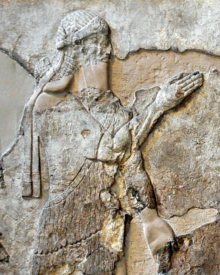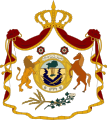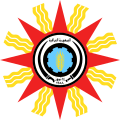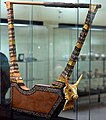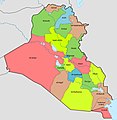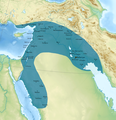
Back بوابة:العراق Arabic প্রবেশদ্বার:ইরাক Bengali/Bangla دەروازە:عێراق CKB Portal:Irak Spanish Portail:Irak French Portal:Iraq Malay Portal:Iraque Portuguese Портал:Ирак Russian Portal:Irak Turkish باب:عراق Urdu
The Iraq PortalA view of Erbil, Iraq
Iraq, officially the Republic of Iraq, is a country in West Asia and in the geopolitical region known as the Middle East. With a population of over 46 million, it is the 30th-most populous country. It is a federal parliamentary republic that consists of 18 governorates. Iraq is bordered by Turkey to the north, Saudi Arabia to the south, Iran to the east, the Persian Gulf and Kuwait to the southeast, Jordan to the southwest, and Syria to the west. The capital and largest city is Baghdad. Iraqi people are diverse; mostly Arabs, as well as Kurds, Turkmen, Yazidis, Assyrians, Armenians, Mandaeans, Persians and Shabakis with similarly diverse geography and wildlife. Most Iraqis are Muslims – minority faiths include Christianity, Yazidism, Zoroastrianism, Mandaeism, Yarsanism and Judaism. The official languages of Iraq are Arabic and Kurdish; others also recognized in specific regions are Turkish, Suret, and Armenian. Modern Iraq dates back to 1920, when a British-backed monarchy under Faisal was established, followed by independent Hashemite Kingdom. It was overthrown by General Qasim, establishing a republic and then ruled by brothers Abdul Salam Arif and Abdul Rahman Arif. The Ba'ath government took power in 1968 coup, first led by Ahmed Hassan al-Bakr and then by Saddam Hussein. Iraq fought the Iran–Iraq War and the Gulf War. In 2003 United States-led coalition invaded and occupied Iraq, initiating the war and defeated the Ba'athists. It continued with an insurgency and civil war, which lasted until 2011. Subsequent continuing repression and sectarian policies of Nouri al-Maliki's government caused protests, after which Ba'athist–Sunni coalition took up arms during a campaign. The climax of the campaign was the offensive by the ISIS that marked its rapid territorial expansion, prompting the return of American troops to fight the war, which lasted until 2017. Iran has also intervened, expanding its influence through sectarian parties and Khomeinist militia groups triggering protests. Post-war conflict still is effect today (Full article...) Selected article -The Akkadian Empire (/əˈkeɪdiən/) was the first known ancient empire of Mesopotamia, succeeding the long-lived civilization of Sumer. Centered on the city of Akkad (/ˈækæd/) and its surrounding region, the empire united Akkadian and Sumerian speakers under one rule and exercised significant influence across Mesopotamia, the Levant, and Anatolia, sending military expeditions as far south as Dilmun and Magan (modern United Arab Emirates, Saudi Arabia, Bahrain, Qatar and Oman) in the Arabian Peninsula.[page needed] The Akkadian Empire reached its political peak between the 24th and 22nd centuries BC, following the conquests by its founder Sargon of Akkad. Under Sargon and his successors, the Akkadian language was briefly imposed on neighboring conquered states such as Elam and Gutium. Akkad is sometimes regarded as the first empire in history, though the meaning of this term is not precise, and there are earlier Sumerian claimants. (Full article...)Selected picture
Shanidar Cave, where the remains of eight adults and two infant Neanderthals were found Did you know...
Selected biography -
Shalmaneser V (Neo-Assyrian cuneiform: [] Error: {{Lang}}: no text (help) Salmānu-ašarēd, meaning "Salmānu is foremost"; Biblical Hebrew: שַׁלְמַנְאֶסֶר Šalmanʾeser) was the king of the Neo-Assyrian Empire from the death of his father Tiglath-Pileser III in 727 BC to his deposition and death in 722 BC. Though Shalmaneser V's brief reign is poorly known from contemporary sources, he remains known for the conquest of Samaria and the fall of the Kingdom of Israel, though the conclusion of that campaign is sometimes attributed to his successor, Sargon II, instead. (Full article...)
General imagesThe following are images from various Iraq-related articles on Wikipedia.
ListsTopicsCategoriesRelated portalsReligions in Iraq Arab states Other countries WikiProjectsThings you can do
Associated WikimediaThe following Wikimedia Foundation sister projects provide more on this subject:
Discover Wikipedia using portals | ||||||||
© MMXXIII Rich X Search. We shall prevail. All rights reserved. Rich X Search





